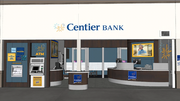News
FIs take lead to fight identity theft
Weekly monitoring tools are among some of the services FIs are providing customers to help combat identity theft.
July 5, 2006
*About the author: Missy Baxter is a regular contributor to ATMmarketplace. Her recent work includes a tribute to the lateJoe Kniceley and an in-depth look at thebattle over interchangebetween merchants and the card associations.
In response to reported increases in identity theft, banks and other financial institutions across the country have started offering identity-theft monitoring products to their customers. Along with using the products as retention tools - and methods of enhancing customer relations - some FIs are touting the new products to up-sell customers and generate additional revenue.
New products and services are quickly entering the market. Take Cincinnati-based Fifth Third Processing Solutions, a division of Fifth Third Bank Corp., as an example. It soon expects to roll out its identity theft-prevention service, called Fifth Third Identity Alert.
The product provides Fifth Third customers with daily e-mail alerts about credit-report changes from all three credit bureaus (Trans Union, Experian and Equifax), unlimited access to credit reports and scores, $25,000 in ID-theft protection, and fraud-resolution and recovery-support.
-- Al Hazen, |
Fifth Third's service was piloted in Columbus, Ohio, and Western Michigan in October.
"We've been really impressed with how well the pilot program has gone," said Michelle VanDyke, an affiliate president with Fifth Third in Western Michigan. "Having been a victim of identity theft myself, I realize what a nightmare it can be for a consumer."
Identity Alert will be offered free to Fifth Third checking-account customers who have multiple bank products, including Fifth Third's electronic or Platinum checking account and/or the bank's bill-payment service.
"We discovered during the pilot program that this product is a wonderful retention tool, and we think it would be valuable for other FIs in recruiting new customers," said Angela Brown, senior vice president of Fifth Third Processing Solutions' Financial Institutions Group. "It gives consumers an added value by offering one more level of security against identity theft."
Fifth Third Processing Solutions plans to sell the service to other FIs, too. Peter Kulik, Fifth Third's EFT product manager, said Identity Alert has been packaged so that FIs can promote it to their customers. For instance, they can charge a fee for the service or package it as a complimentary service for their best customers.
Shocking statistics
The Federal Trade Commission estimates that 10 million Americans this year will have their personal information stolen through various methods, including e-mail phishing attacks, mailbox-raiding and dumpster-diving. Though some observers argue the industry has inflated identity-theft numbers, consumer demand is driving national awareness.
"I wish my bank would've offered something like that back when my ID was stolen in 2004," said Frank Owen, a car salesman in Louisville, Ky. "Some thief had apparently gotten my Social Security number somehow and set up a cell-phone account, among other things. It took months to straighten out everything on my credit report."
According to the FTC, stolen personal information is most often used to open credit-card, utility and bank accounts, and also can be used to intercept employment and government benefits.
Steve Baker, an FTC director, said identity-theft victims last year spent an estimated $5 billion trying to resolve their compromises, above and beyond the monetary damages they suffered from the compromises themselves.
Headlines attest to the growing crisis. The Associated Press in May reported that more than 26 million active-duty military personnel and veterans may be at risk, after their personal information was stolen from a Veterans Affairs database. (Read also, Congress breathes new life into data-security concerns and Data security: Burglar nabs YMCA laptop, data for 65,000 members stolen.)
A definitive difference
Debit or credit fraud - often the result of an electronic-security breach or card-skimming - usually can be detected by the FI that issued the card. Because fraudulent charges are often detected quickly, FIs make it a policy to reimburse their customers.
Identity theft, on the other hand, defined as the unauthorized use of personal information to open fraudulent credit accounts, often goes undetected for months or years and can create a financial mess that takes hundreds of hours to correct.
Incidents of card-compromise and identity theft are growing, and consumers often lump the two types of crime together. That's unfortunate, since FIs often reimburse customers for debit compromises, but not identity theft compromises.
Fighting back
|
Thanks to security-breach notification laws passed in at least 23 states, consumers have a better chance of knowing if their identities are at risk. In addition to increasing legislation at state and national levels, local governments also are making efforts to curtail theft, as is the banking industry. Many states, for instance, have passed laws that allow consumers to request security freezes that alert them when any requests for credit are filed.
"It's vital for anyone in the banking or credit industry to keep up with the latest scams," said Linda Bridgeford, president of Credit Professionals International, a non-profit organization that educates retail-credit professionals and consumers. "Identity theft has become one of the hottest topics at our regional and national conferences. Through CPI's Credit Education Resources Foundation our members volunteer their time at senior citizens centers, civic clubs, schools and other locations across the country to educate consumers about ID theft and ways to prevent it."
To help tackle the problem, banks also are getting in on the action.
In addition to Fifth Third, Atlanta-based SunTrust is using a variety of Equifax Credit Watch products to provide credit-report monitoring via e-mail to its customers. The bank also provides fraud-expense coverage.
SunTrust on May 8 launched its program, Equifax Credit Watch Silver, which provides free protection to personal-checking accountholders. The service includes weekly credit-file monitoring. Within days of suspicious activity, an alert is sent to the customer via e-mail or wireless alert.
Clients also may establish alert parameters based on their spending and usage patterns, so larger-than-normal balances or sudden activity on dormant accounts triggers an alert. And if no alerts are needed in a given month, Equifax sends a "no news is good news" message, accompanied by anti-ID theft news and tips. Participants - like those who sign on for Fifth Third's Identity Alert - have protection. The difference: Fifth Third provides reimbursement of up to $25,000; Sun Trust's Equifax Silver provides identity-theft insurance coverage of up to $2,500.
Hugh Suhr, a SunTrust spokesperson, said the bank's decision to offer the new products was prompted by a consumer survey conducted in April 2006. More than 85 percent of the survey's participants expressed concern about identity theft, yet less than 50 percent said they felt they were taking adequate steps to protect their identities and credit health.
"Early detection is crucial," said Steve Ely, group executive for Equifax Personal Solutions.
Credit-alert products are rapidly becoming a standard offering among banks, said Al Hazen, president of the National Association for Bank Security and Protection, a Fort Lauderdale, Fla.-based consulting firm for the financial industry.
"With more and more new products entering the market, it's becoming rare to find a bank that is not offering some type of service to help consumers avoid ID theft," Hazen said. "The bank industry is clearly moving in that direction and setting up services that notify customers when an anomaly occurs. These types of services and products are crucial, because unless you monitor your credit files morning, noon and night, there's a chance you can get hit."
But some consumer watchdogs say credit-alert products aren't viable solutions.
"Credit monitoring doesn't stop identity theft," said Ed Mierzwinski, consumer program director for U.S. Public Interest Research Group. "The solutions to identity theft are security freezes, getting Social Security numbers out of circulation and improving verification before issuing instant credit."
 ChatGPT
ChatGPT Grok
Grok Perplexity
Perplexity Claude
Claude













